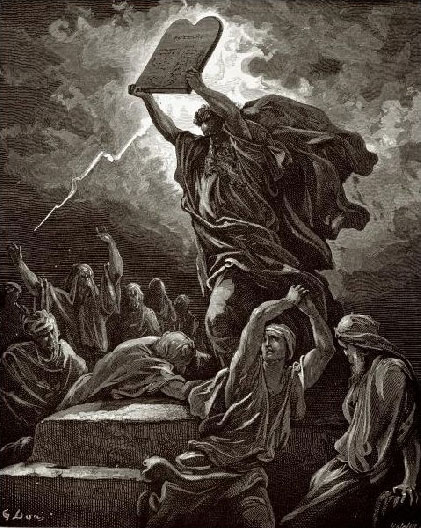Apr
22
2009
“Then He said to the disciple, ‘Behold your mother!’ And from that hour that disciple took her to his own home.” John 19:27
Although they are spread throughout the four gospels, Jesus’ seven words from the cross are easy to put in chronological order. Once in order, they follow the themes of the annual Feasts.
At Firstfruits, Christ on the cross is Moses, mediating between heaven and earth. From the mountain, He transfers His legal responsibility for His mother to John.
He calls her Woman. At this point in the garden, the Lord married Adam to Eve. Of the seven elected Judges, this is Deborah, the warrior-mother. This step is always about the Covenant head lifted up to make a house for Greater Eve.
With this loving act, Christ prefigures the responsibility for the faithful remnant of Old Covenant Israel being transfered to the Apostles.
Interestingly, Revelation 18:7-8 follows the same structure. At the Firstfruits/’Woman/Bride’ step, Israel, who has rejected and killed her Messiah, says, “I am no widow.”
Comments Off | tags: Feasts, Firstfruits, Greater Eve, John, Mary, Moses | posted in Biblical Theology, The Last Days
Apr
16
2009
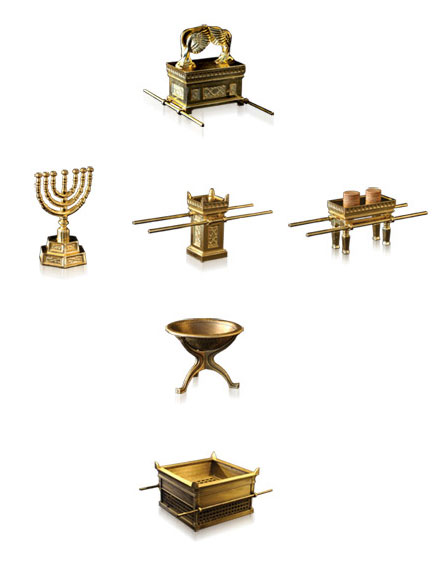
The Tabernacle was not only a “portable Sinai”, the mountain of God laid out across the ground, it was the cruciform Man. We see Jesus, with the Throne of God on His shoulders (the Ark – government), bread and wine in His left hand (the Table - servanthood), the ‘seven stars’ of the Lampstand in His right (dominion), and His feet on the crystal sea (the Laver – resurrection). And He is lifted up “in the air” between heaven and earth (the Altar-Land) as the Mediator Who unites God and man.
As the Ark (Moses), with arms outstretched (Bread – Aaron, and Ruling Lights – Hur), He is the prophet, priest and king Who defeated Greater Amalek at Sinai.
Comments Off | tags: Amalek, Ark of the Covenant, Lamps, Laver, Moses, Revelation, Sinai, Tabernacle, Table of Showbread | posted in Biblical Theology
Apr
16
2009
The Mission
or World Without End?
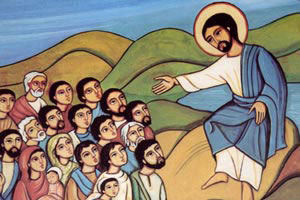
With all the fuss between hyperpreterism and preterism, is it possible both positions are basically right?
Hyperpreterists realise that the apostles were expecting an immiment resurrection, and the partials have to treat verses inconsistently – applying some to AD70 and some to the end of history. But then the hypers have to squish the millennium into AD70 like a fairground mirror. They believe all prophecy has been fulfilled. Not good.
Continue reading
Comments Off | tags: AD70, Against Hyperpreterism, Hermeneutics, Judgment, Moses | posted in Against Hyperpreterism, Biblical Theology, The Last Days
Apr
15
2009
Two Waters
Why is baptism for both males and females, when circumcision was only for males?
I have been following the Exodus pattern through the Bible, and an offshoot of that was an ‘accidental’ application to baptism. I’ll let you decide whether or not you think it holds water.
There are two ‘waters’ in the exodus pattern, the Red Sea (death) and the Jordan (resurrection).
Both are ‘baptisms’, but circumcision pertains to the Passover, the 2nd feast (unleavened bread). It is exit from the world and entry into a new people. There is blood and then water.
With Jordan, there is water, then blood – Jericho, the first conquest. This second baptism pertains to Atonement, the sixth feast. It is entry into, not a people, but an army. (The order of feasts comes from Lev. 23.)
Sabbath – God’s word through Moses (a single mediator for the people – Adam)
000PASSOVER – a baptism (death) that removes Adam’s sin. A ‘people’ assembled
000000FIRSTFRUITS – Moses ascends to receive the Law
000000000Pentecost – the Law given, the people tested
000000Trumpets – the ‘army’ is assembled and the Law repeated (Deut)
000Atonement - baptism (resurrection) and blood shed that removes ‘Eve’ from sin
BOOTHS – the army makes the Promised Land home (a corporate mediator for the nations – Eve).
Israelite males presented themselves before God at Passover/Unleavened Bread, Firstfruits and Booths. (Exodus 23:14-17) picturing the death, resurrection and marriage of the “bridegroom.” Trumpets summoned the people to prepare for Atonement, making ready the “bride.”
WEPOW
19 comments | tags: Atonement, Baptism, Circumcision, Feasts, Greater Eve, Mediator, Moses, Passover, Resurrection | posted in Biblical Theology
Apr
10
2009
Was Moses a murderer?
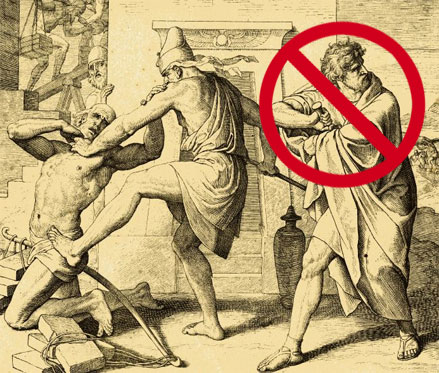 Moses’ execution of the Egyptian was “good death.” It was judicial. Moses had the authority to pass judgment and execute the sentence, and later became the judge of his people. “And Moses was instructed in all the wisdom of the Egyptians, and he was mighty in his words and deeds” (Acts 7:22). However, he rightly feared Pharaoh’s unjust reaction.
Moses’ execution of the Egyptian was “good death.” It was judicial. Moses had the authority to pass judgment and execute the sentence, and later became the judge of his people. “And Moses was instructed in all the wisdom of the Egyptians, and he was mighty in his words and deeds” (Acts 7:22). However, he rightly feared Pharaoh’s unjust reaction.
The Hebrews’ rejection of Moses as their judge condemned them to 40 years’ more slavery. They were at fault, not Moses.
Okay, so Moses did look this way and that, and buried the body in the sand. Yes, but the point was he feared Pharaoh’s reaction.
The Hebrews’ rejection of him as their judge condemned them to 40 years’ more slavery. Just as in the wilderness when Moses was their judge, it was the next generation that would be delivered. Moses was not condemned:
“The Bible never criticises Moses for this, but presents his action as righteous and faithful (Acts 7:24ff.; Heb. 11:24ff.). The execution of criminals is never said to defile the land, or to require atonement; such execution is itself the atonement required.” James B. Jordan, The Law of the Covenant, p. 254-5.
Moses’ judgment pictured the greater one to come upon the Egyptian taskmasters at his return—prefiguring Christ’s ministry in the first century.
Comments Off | tags: James Jordan, Justice, Moses, Typology, Wisdom | posted in Biblical Theology, Ethics
Apr
10
2009
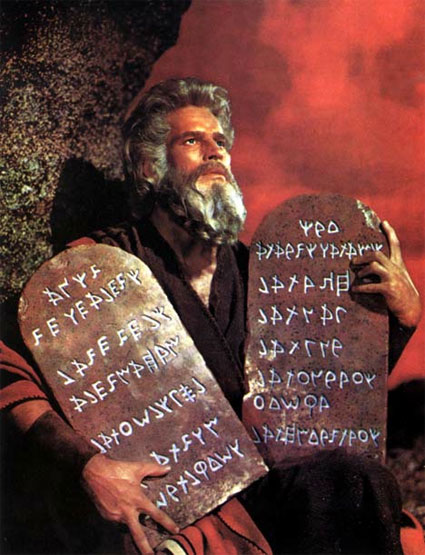
Moses listened on the mountain as God spoke. He digested the law, and repeated it to the next generation in Deuteronomy, partly in a song that he taught them.
Moses’ tabernacle was silent. It was misused and dismembered, then reconstructed in the ‘next generation’ as the Tabernacle of David, with music and Gentile singers.
Continue reading
Comments Off | tags: Culture, Moses, Priesthood, Tabernacle, Temple | posted in Biblical Theology, Ethics
Apr
10
2009
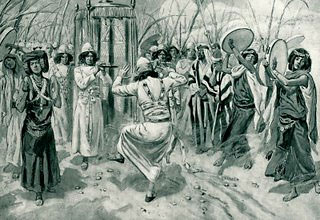 What gave David the right to add music, singing and dancing to the Tabernacle worship? The Tent of Moses was a place of silence.
What gave David the right to add music, singing and dancing to the Tabernacle worship? The Tent of Moses was a place of silence.
The answer is in Deuteronomy. The Law was given to Moses at Sinai (Firstfruits), and repeated to the next generation before Israel crossed the Jordan. In between was 40 years of testing in the wilderness. God spoke at Sinai, and Moses listened in silence. But in Deuteronomy (Trumpets), it was Moses, the mediator, who “sang” the Law (Deut 31-32).
On to King David. After the continued flagrant disobedience of the sons of Eli, the Ark took itself into the ‘wilderness’ on Israel’s behalf at the hand of the Philistines, and conquered the serpent (Dagon). Besides a plunder of Philistine gold, it returned with both Jew and Gentile singers in a restructured worship that included music. The silent Tent of Moses, ready to pass away, had been broken down and prepared for incorporation into a permanent Temple built of David’s spoils. It was a bride ready for Solomon the bridegroom.
In the New Testament, following Christ’s example, the church came out of the Egypt of corrupted Judaism. She was tested in the wilderness, like Israel, with persecution and false teachers. Before the full inauguration of the New Covenant in AD70, she was presented as a bride ready for her husband, a rebuilt Tabernacle of David (Isaiah 16:5; Amos 9:11; Acts 15:16). Paul the tentmaker had completed the difficult process of stitching together a bride from both Jewish and Gentile worshippers. Purified by testing, she was a wise virgin with her lamps full of Pentecost oil. Her music was a new song accompanied by the seven Trumpets that brought the fall of Herod’s Jericho. The marriage feast of the Lamb followed, and Greater Solomon now rules the earth with His bride – a Temple built of living stones – until all enemies are under His feet.
At ascension (Firstfruits), Adam speaks and Eve listens as a people. Testing follows. At Trumpets, Greater Eve is a holy army ready to conquer. Now Eve sings.
Comments Off | tags: David, Feasts, Moses, Tabernacle, Temple | posted in Biblical Theology
Apr
10
2009
There is a lot of truth in theonomy. But things have changed since the time of Moses. At that point, the church and state were basically one.
After the exile, things were different. The role of the Jews was to be priests within the Gentile state. They no longer had the right to administer capital punishment. When they witnessed faithfully, there was a Jew at the emperor’s right hand, steering the empire for God’s people and their stand for the truth.
By the time of Christ, instead of a Joseph, Daniel or Mordecai, the Jews had a Haman, a Herod. Instead of being a nation of priests, they wanted a king like the Gentiles. This makes Herod even more culpable for his role in the death of Christ, standing (legally) at the right hand of the power.
I believe the church today is exactly the same. The church administers ‘inhouse’ justice through excommunication. When the church is faithful in disciplining itself, and thus witnesses faithfully, it stands side by side with the state in administering capital punishment. Our failure to witness has led to ‘life’ for murderers and death for the innocent.
The Bible is clear on the shedding of innocent blood. A murderer dies to atone for the blood he shed. It is judicial. Correlating capital punishment with abortion is a total misunderstanding of justice.
As in AD70, perhaps all the innocent blood shed in this gospel age will be atoned for by the final generation. The murderers are marked like Cain for now, but Abel’s blood will be atoned for.
Comments Off | tags: Abel, AD70, Atonement, Daniel, Haman, Herod, Joseph, Mordecai, Moses, Theonomy | posted in Ethics
Apr
10
2009
I recently found a quote that deals wonderfully with the argument that Genesis was just a story written to refute the errors in the paganism of the time, not to describe the actual biological history of the world:
“…while it’s quite unlikely that Moses was thinking, “Take that, Darwin!” when he set pen to papyrus, it will turn out that by refuting Enuma Elish, Genesis also refutes Darwin, because Darwinism, at bottom, is nothing but Enuma Elish baptized in post-Enlightenment balloon juice. Anyone with Longman’s literary expertise ought to see this very clearly.
Enuma Elish says the world as we know it today was born in an orgy of chaos, sex, and death, and these three forces are the engine from which all life springs. Darwin explains that the various species arise from a combination of random mutation (chaos) and natural selection (sex and death). The big difference is that Darwin said it in a way that post-Enlightenment man wouldn’t laugh at. Hawking likewise has nothing to add that Enuma Elish hasn’t already offered to the world, only to have Genesis soundly refute it.”
You can read Tim Nichols’ full article here:
How Not To Read Genesis
2 comments | tags: Enuma Elish, Genesis, Hermeneutics, Moses, Tim Nichols | posted in Apologetics, Creation, Quotes






